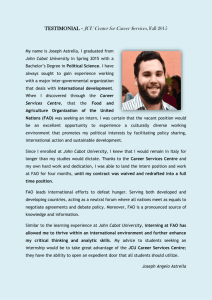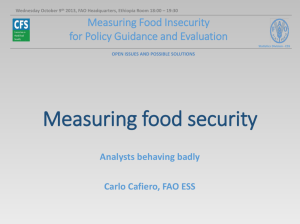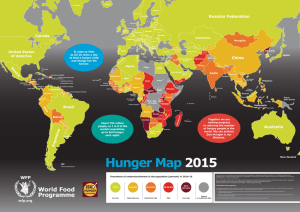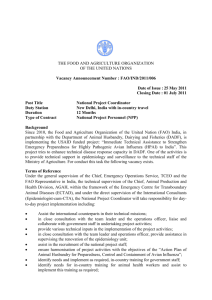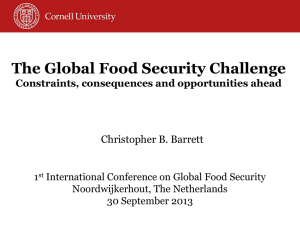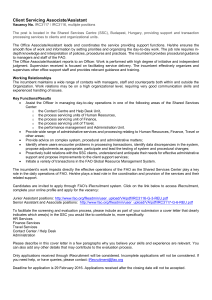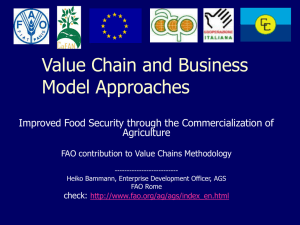Emerging Food Safety Issues in WTO Global Scenario at FAO (3
advertisement
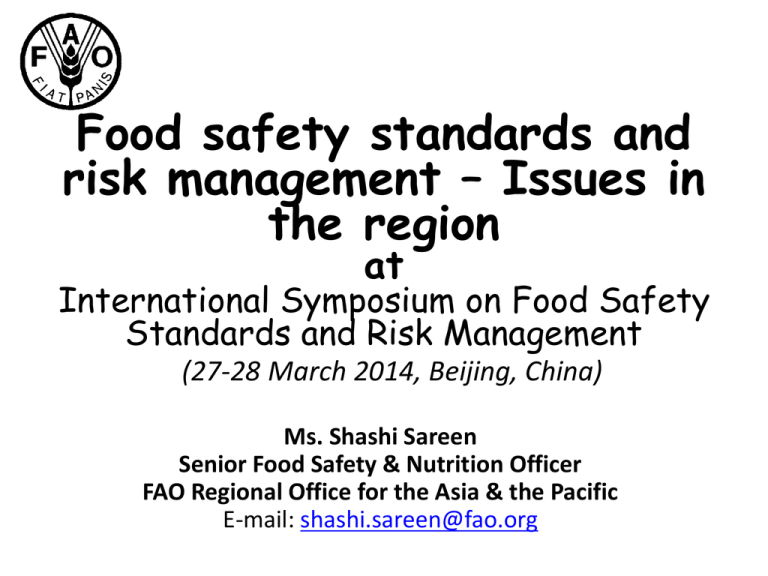
Food safety standards and risk management – Issues in the region at International Symposium on Food Safety Standards and Risk Management (27-28 March 2014, Beijing, China) Ms. Shashi Sareen Senior Food Safety & Nutrition Officer FAO Regional Office for the Asia & the Pacific E-mail: shashi.sareen@fao.org Outline/Coverage Introduction Challenges/ Issues in the Region Some FAO Activities/ initiatives towards food safety and risk analysis in the Region Some future priorities/ focus areas for food safety in the region Introduction • Globalization - increasing demand by consumers for variety of foods • Creation of global market - transboundary movement and trade of food across countries – imports/exports • Potential for spread of contamination across countries high • Leading to increasingly new challenges & risks to the health & safety of consumers • Quality, health, safety, labelling, food fraud (melamine, horsemeat) incidents acquiring global focus • Food safety standards play an important role – role of government, FBOs, international/ other organizations Food Safety Challenges in Asia 1/2 • Low importance to food safety by government/other stakeholders - food safety incidents often unreported so impact of food safety not well recognized measurement of FS status poor • Food safety is a cross cutting area across sectors – multiple agencies & coordination important • Legislation/National food control system outdated • Lack of data – foodborne diseases surveillance, food monitoring (risk-based standards and monitoring) • Linking b/w PP & processing – Traceability– food chain • Lack of clear role of regulatory/ voluntary/ private standards Food Safety Challenges 2/2 • Lack of suitable infrastructure and resources in terms of financial/ personnel • Globalisation leading to increasingly new hazards & risks – addressing these is a challenge • Regional trade important – but levels of food safety differs • Lack of clarity in application of a preventative risk-based approach across entire food chain • Awareness at different levels and their roles – FBOs (producers; processors; handlers; retailers...), government, consumers FAO Vision • Achieving food security for all is at the heart of FAO's efforts – to make sure people have regular access to enough high-quality food to lead active, healthy lives. Food security: all people, at all times, have physical, social and economic access to sufficient, safe and nutritious food to meet their dietary needs and food preferences for an active and healthy life. [World Food Summit, 1996] Food Safety Approaches Food chain approach – hazards may arise at different stages of the food supply Preventative risk-based approach is followed rather than a reactive one based on sampling & testing (GAP, GMP, HACCP) Sound national food control & regulatory systems essential – standards & implementation (risk management) Roles and responsibilities for food safety - all actors in the food chain namely- farmer or producer, processor, handlers, government, consumer FAO’s Regional Food safety CB Activities • Around 15 - 20 projects/ programmes on food safety & quality (national/ regional) & tools & GL developed • Broadly cover: Food safety policies, legislation, governance (including coordination mechanisms) SPS/standards & norms/ Codex related activities Enforcement/surveillance-inspection, testing, FBDS Food safety in various agro food supply chains (commodity issues) - including street foods/ retail food safety – GAP/GVP/FSMS linkage to primary production Food safety emergency management/ recall systems Certifications and accreditation Trainings/ awareness/ education Some Current Projects in the Region Regional projects: • ASEAN - Support to CB & Implementation of International Food Safety Standards in ASEAN Countries”(WS, training course, case studies, guidance documents) • GMS - Promotion of rural development through development of Geographical indications at regional level in Asia • SAARC - Good Agriculture Practice (GAP) Certification Scheme in countries of SAARC Some Recent & Ongoing Projects in Asia …2 • Country Projects: Improving food safety in Bangladesh Enhancing SPS Capacity of Ginger Exports through PPP (Nepal) Policy assistance for bio-secure agro-food supply chain(Nepal) Developing food law in Laos Strengthening of Food Safety and Standards in Bhutan Strengthening of National Codex Capacity in Mongolia CB to improve market access for fish & fishery products (Myn) Strengthening Vietnamese SPS capacity for trade – improving safety & Q of fresh vegetables through value chain approach Institutional Strengthening on Food Safety & QC in Supply Chain Management of Livestock Products & INFOSAN (Thailand) Strengthening the food safety information, education, communication capacity to assist implementing Food Safety Law and National Strategy on food safety (Vietnam) Workshops/ Consultations/ Trainings • Regional Consultation on Food Safety Policy development in Asia • Regional Consultation on Equivalence/MRAs to Facilitate Trade of Safe & Q Food (SAARC) • Regional Workshop for Asian Countries on hygiene and safety in food retail • Risk analysis - Chemical risk analysis in the food chain; RA for SAARC • Food Safety Emergency ResponseSER – pilots, WS and trainings • GAPs - Implementing GAP in F&V, its Certification & Accreditation • Study of the food safety scenario in countries for strengthening coordination b/w departments Information Exchange Mechanisms • FAO Food Safety and quality home page http://www.fao.org/food/food-safety-quality/homepage/en/ • Web page on Vet & Public Health, Feed & Food Safety; www.fao.org/ag/AGAinfo/programmes/en/A6.html • Emergency prevention & early warning in area of food safety (EMPRES Food Safety): EMPRESFS@fao.org • *FAO Regional office for Asia and the Pacific http://www.fao.org/asiapacific/rap/home/en/ • *Capacity Building and implementation of international food safety standards in ASEAN countries http://foodsafetyasiapacific.net/ Some regional publications on food safety Priorities for food safety and RM in the Region Strengthening food safety coordination mechanism Food safety indicators – strategy for region Risk analysis – detailed activities/trainings eg risk profiling, exposure assessment, risk communication (enhance capacity) Harmonization of standards & technical regulations on food – clear role of regulatory & voluntary standards Risk-based monitoring and inspection procedures – import control systems, risk categorization, sampling guidelines, curriculla Food Recall & Traceability –support countries for application in National FS Control- RASFF Surveillance (food-borne illness surveillance), RMP, labs Priorities of food safety and RM in the Region Food retail - Regional network & guidance documents, checklists, training modules Primary production aspects - Strengthening GAP in different sectors sector (developing schemes & certification systems) Education & training programmes for all stakeholders Recognition arrangement for acceptance of products within region & with countries outside region Regional mechanism for accreditation (inspection, testing, certification) Increased collaboration for use of regional expertise & knowledge – information exchange, awareness and trainings, RA, test facilities THANK YOU Any Questions? Shashi.sareen@fao.org
